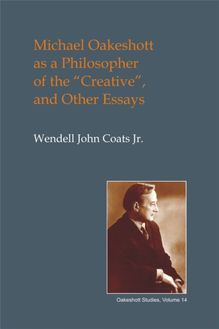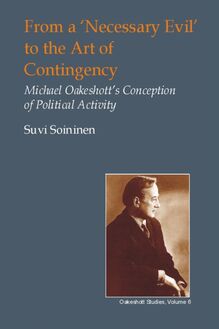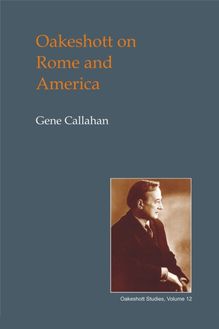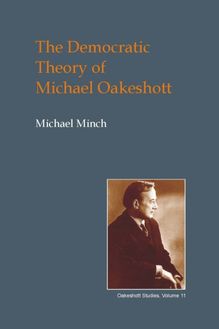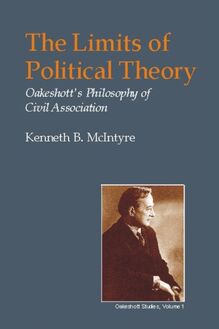From a 'Necessary Evil' to the Art of Contingency , livre ebook
167
pages
English
Ebooks
2015
Vous pourrez modifier la taille du texte de cet ouvrage
Obtenez un accès à la bibliothèque pour le consulter en ligne En savoir plus
Découvre YouScribe en t'inscrivant gratuitement
Découvre YouScribe en t'inscrivant gratuitement
167
pages
English
Ebooks
2015
Vous pourrez modifier la taille du texte de cet ouvrage
Obtenez un accès à la bibliothèque pour le consulter en ligne En savoir plus
Publié par
Date de parution
15 octobre 2015
Nombre de lectures
2
EAN13
9781845405243
Langue
English
Publié par
Date de parution
15 octobre 2015
Nombre de lectures
2
EAN13
9781845405243
Langue
English
Title page
From a ‘Necessary Evil’ to the Art of Contingency
Michael Oakeshott’s Conception of Political Activity
Suvi Soininen
Copyright page
Copyright © Suvi Soininen, 2005
The moral rights of the author have been asserted.
No part of any contribution may be reproduced in any form without permission, except for the quotation of brief passages in criticism and discussion.
Originally published in the UK by Imprint Academic
PO Box 200, Exeter EX5 5YX, UK
Originally published in the USA by Imprint Academic
Philosophy Documentation Center
PO Box 7147, Charlottesville, VA 22906-7147, USA
2013 digital version by Andrews UK Limited
www.andrewsuk.com
imprint-academic.com/idealists
Acknowledgements
First of all, I would like to thank Professor Kari Palonen, who served as an invaluable source of inspiration and generosity as the supervisor of my doctoral thesis, of which this book is a revised version. In the same breath I would also like to thank the project “Polity, Contingency and Conceptual Change,” led by Kari Palonen and financed by the Academy of Finland, for its support and for providing me with the financial support necessary in order to complete this work.
I would also like to extend my gratitude to Professors Pertti Ahonen and Kyösti Pekonen, who were the first to review this manuscript.
Thanks also to Professor Bruce Haddock, who supervised me during my three-month visit at the University of Wales, Swansea, in 2001.
Steven Gerencser has offered me countless valuable comments and I would also like to thank him for agreeing to act as my opponent when I defended my thesis. I would also like to thank Professor Quentin Skinner, whom I have had the pleasure of meeting on several occasions, for offering me invaluable information on Oakeshott’s academic life, Cambridge and the London School of Economics and Politics, as well as for the genuine interest he took in my work.
I would also like to take this opportunity to thank Leena Subra for reading and commenting on my work. I also wish to thank Anitta Kananen, Kia Lindroos and Sari Roman, as well as the other participants of the research seminars organized by the unit of Political Science at the University of Jyväskylä.
The Michael Oakeshott Association and its web pages have been invaluable assets in the completion of this work. Leslie Marsh’s efforts in this field are indescribable, and I would also like to thank him for his support of my work.
Efraim Podoksik provided a generous and detailed critique of my manuscript from which this book has greatly benefited.
I would also like to thank my friends for their support, especially Anssi Välimäki for providing me with so much intellectual inspiration and support throughout the process of writing this book.
I also want to thank my family; my sister Sari Soininen, her husband Timo Tuovila and their children, as well as my father, Antti Soininen. My mother Raili Soininen has inspired and guided my interest in reading and studying throughout my life. Thanks also to my mother-in-law, Aili Rehtola.
Last but not least, I would like especially to thank my husband Antti Rehtola, to whom I dedicate this book.
Abbreviations
Works by Oakeshott
EM Experience and Its Modes (1933)
SP The Social and Political Doctrines of Contemporary Europe (1939)
RP Rationalism in Politics (1962, new and expanded edition 1991)
OHC On Human Conduct (1975)
OH On History and Other Essays (1983)
VLL The Voice of Liberal Learning (1989)
MPME Morality and Politics in Modern Europe (1993)
RPML Religion, Politics and the Moral Life (1993)
PFPS The Politics of Faith and the Politics of Skepticism (1996)
WH What is History? and other essays (2004)
A remark on presenting references in the study
Oakeshott references are usually given with the year of the first published edition of a given essay or article, its title, the abbreviation of the essay collection and page number. The appearance of a question mark in the reference means that the article/essay in question has been published posthumously and an approximation of the date it was written is provided when necessary in order to follow chronological order. Estimated dates of publication are provided by the editors of a given collection if not otherwise noted. The original publishing forum is also mentioned when necessary. The Politics of Faith and the Politics of Skepticism and What is History? and other essays were published posthumously in their entirety.
Chapter I: Introduction: Why Oakeshott?
1: Oakeshott and Politics: The Perspective
It is quite common to speak about Michael Oakeshott’s (1901-1990) conception of politics. One famous formula is, of course, Oakeshott’s metaphor of politics as a “bottomless and boundless sea; there is neither harbour for shelter nor floor for anchorage, neither starting-place nor appointed destination.” [1] As Oakeshott himself anticipated, this characterization of politics has affected many people representing many different genres: for progressivists, it represents the death of ideals, but it also delights die Schwindelfreien , [2] who feel no vertigo in the face of it and welcome its anti-foundationality. Equally famously, politics appears as the custody of a manner of living, reflecting Oakeshott’s reputation as a conservative. Furthermore, some have characterized his conception of politics as a “politics of conversation,” further accentuating its anti-foundational and rhetorical nature. For me, none of these characterizations alone is satisfactory. Yet, each one has its own place in the portrait of Oakeshottian politics that I paint in this book.
My main theme can perhaps best be expressed by presenting two quotations. In 1939, Oakeshott wrote on politics:
Political action involves mental vulgarity, not merely because it entails the concurrence and support of those who are mentally vulgar, but because of the false simplification of human life implied in even the best of its purposes. [3]
In 1975, politics was characterized instead as calling for:
... so exact a focus of attention and so uncommon self-restraint that one is not astonished to find this mode of human relationship to be as rare as it is excellent. [4]
Whereas in Oakeshott’s early thought politics was seen as better suited to people who were mentally simple or vulgar, especially in comparison with poets and philosophers, in the later account the ideal type of politics required a specific and high level of political intelligence. [5] Thus, although one need not need take all of Oakeshott’s most pointed expressions literally, the differences between the texts from the late 1930s and the mid 1970s, which is also the period examined in this book, are still so great that I find it important to pointedly examine the development of his conception of political activity in order to do justice to the flexibility and sensitivity exhibited by his political thought in its contemporary context without compromising any of its originality.
I will argue that it is incorrect to speak about Oakeshott’s conception of political activity as such, as it must be dissolved into many different conceptions. It might initially seem as though there are only slight differences in nuance between his texts on politics or political activity, but in the long run I think we can argue that there is a clear shift in Oakeshott’s understanding. First, his attitude towards political activity shifts from near disdain towards what could be called applauding of politics. Second, the elements that Oakeshott attaches to his description of political activity imply an increasing emphasis on politics as a reflective activity as opposed to the habitual continuation or preservation of a political tradition.
In short, then, I examine in the following why and how Oakeshott’s attitude towards political activity changed. Further, I deal with the question of what specific aspects are present in Michael Oakeshott’s conception(s) of politics and the related terms in the context of other contemporary ideas and theories. How does Oakeshott’s vocabulary change over the course of this period? Are these changes significant? What kind of relevance does Oakeshott have in the contemporary discussions on political theory and thinking? These questions form the main body of the problematic examined in this book.
I will examine Oakeshott’s conception of political activity in the British context, mainly within the specific context of post-war political thought. It is important to clarify some of the aspects which contributed to my decision to limit my examination to this primary context. First, in my view there is something called “British postwar political thought,” which should be distinguished from the broader genre of “Anglophone political thought” that includes the United States. Secondly, I claim that Oakeshott occupies a significant place in the sphere of British postwar political thinking. Thirdly, we must take a specific interest in the relationship between the two. My assertion in this book is that the examination of Oakeshott’s vocabulary and its connection to the vocabularies of other contemporary thinkers enables us to uncover innovative ways of conceptualizing the ‘political’ and ‘politics’ in relation to some key concepts of British political thought. I also argue that Oakeshott’s political thought develops through interaction with his interpretations of ‘real’ contemporary British politics; Oakeshott’s paradigm conception of political activity is inherently British.
The perspective from which I approach Oakeshott’s oeuvre and the British and Anglo-Saxon debate is that of an “outsider.” By this I mean that I retain a certain detac

